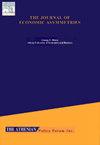Asymmetric transmission of crude oil prices into fuel prices - Evidence from Pakistan
Q1 Economics, Econometrics and Finance
引用次数: 0
Abstract
Research on the pass-through of international crude oil prices into domestic fuel prices has mainly focused on countries with market-driven fuel prices, but overlooked countries wherein fuel prices are set by the government. Against this background, we study the dynamics of price transmission between international crude oil markets and petroleum, light diesel and kerosene retail markets in Pakistan, an oil-importing developing country where fuel prices are regulated by the government. Our hand-collected dataset consists of the government's biweekly notifications on petroleum, light diesel and kerosene retail prices in Pakistan, and international crude oil prices from January-2007 to March-2022. We employ threshold-cointegration models and the associated asymmetric vector error-correction model to analyze the long-run and short-run mechanisms of fuel price adjustments in Pakistan. Our empirical estimates reveal that Pakistan's fuel retail markets are cointegrated with international crude oil markets, but the underlying price-adjustment process is relatively slow. We find evidence of the “rockets and feathers” phenomenon in petroleum retail prices, but not in light diesel and kerosene retail prices in Pakistan. The “rockets and feathers” phenomenon in petroleum retail prices is driven by the government's tendency to exploit decreases in international crude oil prices to increase taxes on petroleum, instead of lowering petroleum retail prices in Pakistan. The observed differences in the mechanisms of price transmission from international crude oil markets into the petroleum, light-diesel and kerosene retail markets in Pakistan highlight that government-regulated fuel prices serve as a policy lever for balancing fiscal constraints with political economy considerations in oil-importing developing countries.
原油价格向燃料价格的不对称传导——来自巴基斯坦的证据
关于国际原油价格对国内燃料价格传递的研究主要集中在市场驱动燃料价格的国家,而忽视了由政府设定燃料价格的国家。在此背景下,我们研究了国际原油市场与巴基斯坦石油、轻柴油和煤油零售市场之间的价格传导动态。巴基斯坦是一个石油进口发展中国家,燃料价格由政府监管。我们手工收集的数据集包括政府从2007年1月至2022年3月每两周发布的巴基斯坦石油、轻柴油和煤油零售价格通知,以及国际原油价格。我们采用阈值协整模型和相关的非对称矢量误差修正模型来分析巴基斯坦燃料价格调整的长期和短期机制。我们的实证估计表明,巴基斯坦的燃料零售市场与国际原油市场协同整合,但潜在的价格调整过程相对缓慢。我们在巴基斯坦的石油零售价格中发现了“火箭和羽毛”现象的证据,但在轻柴油和煤油零售价格中却没有。石油零售价格的“火箭和羽毛”现象是由政府倾向于利用国际原油价格下跌来增加石油税,而不是降低巴基斯坦的石油零售价格所驱动的。从国际原油市场到巴基斯坦石油、轻柴油和煤油零售市场的价格传导机制所观察到的差异突出表明,在进口石油的发展中国家,政府管制的燃料价格是平衡财政限制与政治经济考虑的政策杠杆。
本文章由计算机程序翻译,如有差异,请以英文原文为准。
求助全文
约1分钟内获得全文
求助全文
来源期刊

Journal of Economic Asymmetries
Economics, Econometrics and Finance-Economics, Econometrics and Finance (all)
CiteScore
4.80
自引率
0.00%
发文量
42
审稿时长
50 days
 求助内容:
求助内容: 应助结果提醒方式:
应助结果提醒方式:


